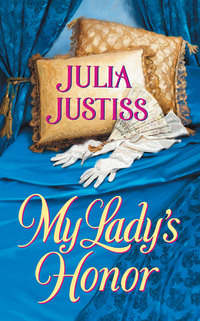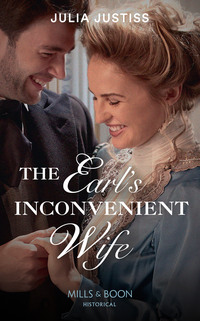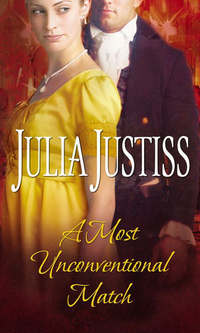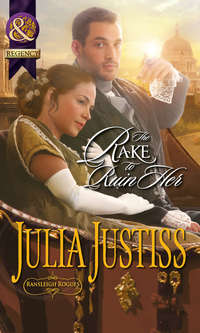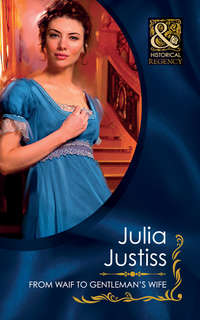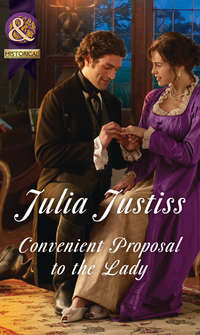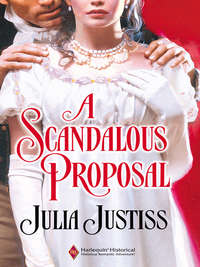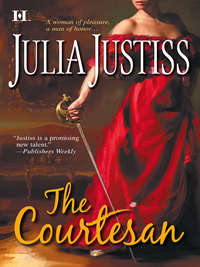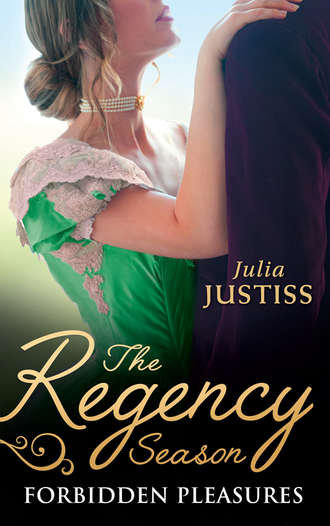
Полная версия
The Regency Season: Forbidden Pleasures: The Rake to Rescue Her / The Rake to Reveal Her
It had been wise to elicit the aid of anyone willing to help her in her battle with the Duke—that much she owed to James. But to assume that Alastair Ransleigh or anyone else would stand by her was foolish. Not only foolish, it put James’s safety at risk to depend upon support that could disappear as unexpectedly as the whim to offer it.
Alastair hadn’t denied it when she’d stated that he’d only be around a short time. He’d pledged to have a solicitor spell out the legal parameters of the threat she faced. She could not expect him, nor had he offered, to involve himself beyond that point. She must prepare herself to enter the struggle and deal with its consequences alone.
She began to consider what she would do if the solicitor returned an unfavourable assessment of her ability to retain custody of James.
Allowing him to go to Graveston was out of the question. She would flee England before she’d permit that. With the war finally over, they might be able to settle in some small rural village in France. Her French was impeccable—Papa had seen to that; she could give lessons in English, piano, watercolours.
Except how was she to obtain a position without references? The amounts she could obtain from selling her few remaining jewels would support them for a time, but even in the depressed economy of a war-ravaged area, they wouldn’t be able to live on them for ever.
She had no other assets besides that small store of jewellery, inherited from her father’s mother. Not grand enough that the Duke had permitted her to wear any of it, nor valuable enough for him to bother selling the pieces, she’d been able to secrete them away. She’d left all of the ornate and valuable jewels presented to her by the Duke at Graveston Court, wanting nothing that reminded her of her life as Graveston’s Duchess.
What would she do if they exhausted her small store of assets?
Coming up with no answers, exasperated with pacing, she decided to go visit James. She felt a slight smile curving her lips. As Alastair had predicted, her son was always glad to see her.
‘Let him love you,’ Alastair had advised. She’d been trying that, not forcing her emotions, simply chatting with him, asking about his interests and responding to his answers.
He particularly loved getting outdoors, but that wasn’t wise today. Suddenly, she remembered something else she might try. The morning after Alastair had given her back the pearls, a package arrived containing the box of watercolours and the sketchbook she’d told him to return. Not knowing from which establishment he’d obtained them, she had kept them.
On impulse, she gathered the supplies from her wardrobe and continued to the nursery.
As she entered, James was listlessly pushing a soldier around on the floor before the hearth, a picture of boredom. When he turned to see her, his small face lit up and he jumped to his feet. At that expression of gladness, Diana felt herself warm.
‘Mama! Can we go to the park? It’s not raining any more.’
‘That’s true, but I fear it is still very wet.’ Giving the nursemaid a nod, she walked over to seat herself at the table before the fire, setting down the package. James hurried over to perch on the bench beside her. ‘Just think how cross Minnie would be if she had to soak out of your breeches all the dirt you would surely get on them, jumping in and out of puddles.’
His face fell. ‘I promise I won’t go in puddles.’
He looked so earnest, she had to laugh. ‘I know you would try to be good, but heavens, how could anyone resist discovering how deep the puddles are, or seeing how high the water splashes when one jumps in them? I know I cannot, and Annie would be even crosser than Minnie if she had to press the mud out of my skirts. No, I’ve brought something else for us.’
His crestfallen look dissolved in curiosity. ‘In that package? May I open it?’
‘You may.’
He made quick work of the wrappings, unlatched the box and drew out a brush. ‘How soft it is!’ he exclaimed, drawing the bristles across his hand. ‘It’s awfully little for scrubbing, though.’
‘It’s not for scrubbing. It’s for painting. Those little dishes contain watercolours. Minnie, would you pour some water in that bowl and get James something he can use as a smock? A nightshirt will do.’
Though it had been years since she’d prepared paints, she fell back into the familiar pattern immediately, blending into the dishes some of the paint with water from the bowl brought by the nursery maid. By the time the girl had James’s nightshirt over his head to protect his clothing, Diana had half-a-dozen colours prepared for his inspection.
‘Which colours do you like the best?’
‘Red and blue,’ he pointed out promptly. ‘What do we do now?’
‘We decide what we want to paint.’
James looked around quickly. ‘My soldier!’
‘Good choice. Let’s sit him on the table so we can see him better. First, we’ll make an outline of his body, then fill in with the colours.’
She showed James how to dip his brush in the paint, then stroke the brush across the sketchpad. She expected that after a few minutes of meticulous work he would get bored with the process, but he did not, continuing with rapt attention under her direction and suggestions until he’d completed a creditable soldier in a bright-red coat and blue trousers.
‘That’s very good!’ she said approvingly, surprised that it was true. Even more surprised that, with his head bent and a rapt expression on his face, James reminded her of her father, recording in deft brushstrokes the details of one of the plants he’d discovered.
Another wash of heat warmed her within. Perhaps Alastair was right. Perhaps there was more of her—and her father—in the boy than she’d thought.
Vastly pleased with his work, James was delighted when she set it above the mantel. ‘There, you’ll be able to see it from your bed and admire it as you eat your supper.’
‘Look at my painting, Minnie!’ he cried to the nurse, who, to Diana’s mild amusement, hovered nearby whenever Diana visited her son. Though the girl seemed to have somewhat relaxed her vigilance, Diana sensed Minnie still didn’t entirely trust her mistress’s sudden, unprecedented interest in her charge.
‘That’s wonderful fine, young master,’ the maid answered, a deep affection in her tone. ‘A right handsome soldier you’ve drawn.’
‘Mama, will you make one, too?’
‘If it would please you.’
‘Oh, yes! I’d love having something from you, something to keep.’
The artless words pricked her again, reminding her how little she’d offered her son since she’d forced herself to turn away from him as a toddler. True, she’d had a compelling reason for withdrawing from him—but no more. Silently she renewed her vow to do better.
‘What kind of picture do you want?’
‘Another soldier.’
‘Very well.’ Taking the brush from him, she deftly created a replica of the toy soldier. James looked over her shoulder as she painted, seeming entirely absorbed.
When she finished, he gave a little sigh of awe. ‘Oh, Mama, that’s wonderful! He looks just like my soldier. Will you put him on the mantel next to mine, so they can keep each other company?’
‘Of course.’
After she’d arranged the two pictures side by side and stepped back, James clapped his hands with delight. ‘It’s like having more soldiers for my army! Only maybe better, ’cause you and me made them together. Thank you, Mama!’
Jumping up, he ran over and wrapped his arms around her.
Still not accustomed to hugs, she started—then slowly wrapped her arms around him as well. From deep within, an impulse welled up to pull him nearer, hold him tighter.
Immediately she resisted it...until she realised that she didn’t have to restrain herself any longer.
Let him love you. You’ll find yourself responding.
Hearing Alastair’s words echo in her ears, she hugged James tighter, pressing her face against his soft dark hair. An aching warmth curled around her heart.
As much as she owed Alastair Ransleigh for his efforts to keep her son safe, she owed him even more for this.
* * *
Meanwhile, in the London office of his solicitor, Mr Reynolds, Alastair explained his need for some information regarding settlements.
A smile creased the older man’s face. ‘Dare I hope that means you expect a momentous occasion in the near future? Let me offer my congratulations!’
Startled at first, Alastair had to laugh. ‘I’m afraid not. A close family friend was recently widowed. Her father is now deceased, and she is not aware if settlements were ever drawn up.’
‘Are the circumstances not specified in her late husband’s will?’
‘The circumstances are rather...complicated. What would normally be set up?’
‘Normally, the dowry or portion brought into the marriage by the bride is guaranteed to her as an annuity in the event of the husband’s death. If a specific sum is not mentioned, usually she is deeded some property as her jointure, the income and rents from which are intended to support her after the husband’s death, when his estate passes to his heir.’
‘In the absence of settlements, she would be entitled to a dower?’
‘Yes, to one-third of the property and assets of the estate. Which, for a wealthy man, could be quite considerable, hence the desire for settlements to simplify the process and limit the annuity to a specific sum.’
‘If dower rights were invoked, how would the widow obtain the assets?’
‘The local sheriff’s court would have the handling of it.’
That was what Alastair had feared. ‘And if there were...ill feelings between the heir and the widow?’
Mr Reynolds sent him a questioning look. ‘Would this heir be a man of high rank?’
‘The highest.’
The solicitor gave him a thin smile. ‘Then obtaining her due could be difficult. The local sheriff would, understandably, be reluctant to antagonise a man of wealth and influence in the community. Your widow would require a strong solicitor and a prominent advocate to ensure the heir was compelled to recognise her rights.’
Alastair nodded. ‘Thank you, Mr Reynolds. I appreciate your expertise.’
‘If I can assist you further, please let me know. The poor widow is entitled to her due.’
‘She is indeed,’ Alastair agreed. ‘I will certainly call upon you again if circumstances require it.’
‘Always a pleasure to serve you,’ Mr Reynolds said with another smile as he ushered Alastair to the door.
As he paced the street to summon a hackney, Alastair mulled over what he should do next.
Would the new Duke really make problems for Diana? How much of her suspicion and foreboding were the results of her miserable existence as his father’s wife? Would the mature Blankford have outgrown his youthful resentment?
There was only one sure way to find out.
He’d just have to make a trip to Graveston Court.
Chapter Twelve
Several days later, Alastair passed through the entry gates and rode down a long, tree-bordered lane. Around one bend, set like a jewel against the hill behind it, its long columned facade reflected by a symmetrical pond before it, stood the huge Palladian mansion that was Graveston Court.
After turning his mount over to a waiting lackey, he was admitted by a grim-faced butler, ushered through the marbled entrance down a corridor flanked with what appeared to be Grecian antiquities, and shown into a beautifully appointed parlour. The Duke would be informed of his arrival, the butler intoned before bowing himself out.
So this was the prison in which Diana had been trapped for so many years, Alastair thought. He paced the room, whose arched windows, flanked by gold brocade drapery, echoed the Palladian influences evident in the mansion’s facade. More antiquities—vases embellished with Greek battle scenes, Roman busts and bas-relief carvings—were set on pedestals or artfully arranged on shelves.
The scale was oppressively overwhelming, everything about the room and its opulent furnishings designed to dazzle the visitor and intimidate him with a sense of his insignificance, compared to the wealth and rank of his host.
At length, losing interest in examining the various treasures, Alastair took a seat on the lavishly embellished gold sofa, and waited. And waited. And waited some more, his anger beginning to smoulder.
Of course, he had arrived without notice and the new Duke would have many pressing matters to attend to, taking over the reins of such a large estate. However, leaving him tapping his fingers this long, without an offer of refreshment or any other courtesy, was, Alastair felt sure, a deliberate insult.
Any deference to rank Alastair might once have felt had long since been dissipated by the refusal of his uncle, the Earl of Swynford, to support his younger son, Alastair’s cousin and best friend, after the scandal that had embroiled Max at the Congress of Vienna. A deference already worn thin by his army service, where experience and ability was worth far more in battle than rank or title, and his own previous dealings with a Duke of Graveston.
So he was not feeling particularly amiable when the Duke finally deigned to make an appearance.
After exchanging the obligatory bows and greetings, the Duke said, ‘So, Mr Ransleigh, to what do I owe the honour of this visit?’’
The sly smile accompanying those words gave Alastair the distinct impression that the Duke knew exactly who he was and why he was here.
Which shouldn’t come as a surprise. In order for Graveston’s solicitor to have found Diana so quickly, the new Duke must have had his own spies hidden among the household at Graveston, some of whom had trailed her when she fled to Bath after her husband’s death. If those informers remained in the city to watch her, they would have already sent word to the Duke about his relationship with the widow.
If the Duke wished to be coy, not revealing what he already knew, he could play along, thought Alastair, his irritation building. ‘As a friend of the Dowager Duchess, I wished to approach you about a family matter. Gentleman to gentleman, without recourse to involving the sheriff or the courts.’
‘Gentleman to gentleman,’ the Duke repeated, raising an ironic eyebrow. ‘Do proceed.’
‘The Dowager, naturally distraught over the death of her husband, needed time away to compose herself. She seemed to doubt that you would agree to provide her with the support and assistance to which she is entitled as your father’s widow.’
The Duke’s smirk of a smile compressed to a thin line. ‘I’m surprised the doxy is intelligent enough to understand that. Support her?’ His raised voice had a derisive ring. ‘She left Graveston Court voluntarily; let her support herself. I’m sure she wheedled enough baubles out of my father to keep herself in furs, gowns and sweetmeats for the rest of her life.’
‘Nonetheless,’ Alastair countered, holding on to his temper, ‘she’s still entitled to her dower.’
The Duke’s eyebrows lifted again. ‘She can certainly apply for it. Any claims submitted on that account will be referred to my solicitor.’
‘She was your late father’s legal wife. Your man might obstruct, harass and delay such a petition, but in the end, the law will see she gets what she’s entitled to.’
The Duke laughed outright. ‘Oh, I certainly hope she gets what she deserves! My father’s legal wife—ha! Only think, he set aside my mother, who lived only to please him, for her. And what an ideal duchess she made! Incapable of running the household. Contradicting my father in front of his guests. Disputing the gentlemen’s opinions and ignoring the ladies, to whose company she should have directed her attention and remarks. Well, he had little enough joy of her. Just the one brat, after eight years of marriage.’
While Alastair bottled up his mounting ire and disgust, Graveston continued. ‘Ah yes, the brat. I shall very much enjoy helping him discover what it’s like being the son of a displaced mother!’ He smiled, anger glittering in his eyes. ‘I’ll enjoy even more having her know he’s experiencing that delight, and she’s responsible.’
Diana had warned him, but he hadn’t believed it. ‘You would punish a child?’ Alastair asked incredulously, revolted.
Graveston shrugged. ‘Not punish. Just...instil in him a proper recognition of his place. He’ll survive. I did. It will make a man of him.’
A man like you? he thought. No wonder Diana wants to keep her son away.
‘He’s a Mannington brat, for all that, even if he is half hers. Perhaps we can beat that out of him. One can try.’ He smiled again, as if relishing the prospect. ‘He will need to be trained to his role—to serve my son and heir. Which brings me back to a matter more important than the spurious claims of my father’s former wife. Since you seem to be on such good terms with her, perhaps you’ll inform her if she does not return the boy voluntarily, and soon, I shall have the Court of Chancery order it.’
‘She would appeal such a demand. You can’t know for sure they would rule in your favour.’
‘Can I not? When the head of an ancient, venerable family of vast resources magnanimously offers to support a half-brother, even though he’s the spawn of a nobody? Worse than a nobody, a woman whose odd and irregular behaviour forced her husband to banish her from Society. Who fled her home before her husband’s body was scarcely cold, instead of remaining to greet the heir and see proper tribute paid to her late master. Not to mention, as any number of witnesses can testify, a mother who paid practically no attention to her son from his early years until his father’s demise. Do you really think she has any chance to hang on to him? If you’re such a friend
Конец ознакомительного фрагмента.
Текст предоставлен ООО «ЛитРес».
Прочитайте эту книгу целиком, купив полную легальную версию на ЛитРес.
Безопасно оплатить книгу можно банковской картой Visa, MasterCard, Maestro, со счета мобильного телефона, с платежного терминала, в салоне МТС или Связной, через PayPal, WebMoney, Яндекс.Деньги, QIWI Кошелек, бонусными картами или другим удобным Вам способом.


